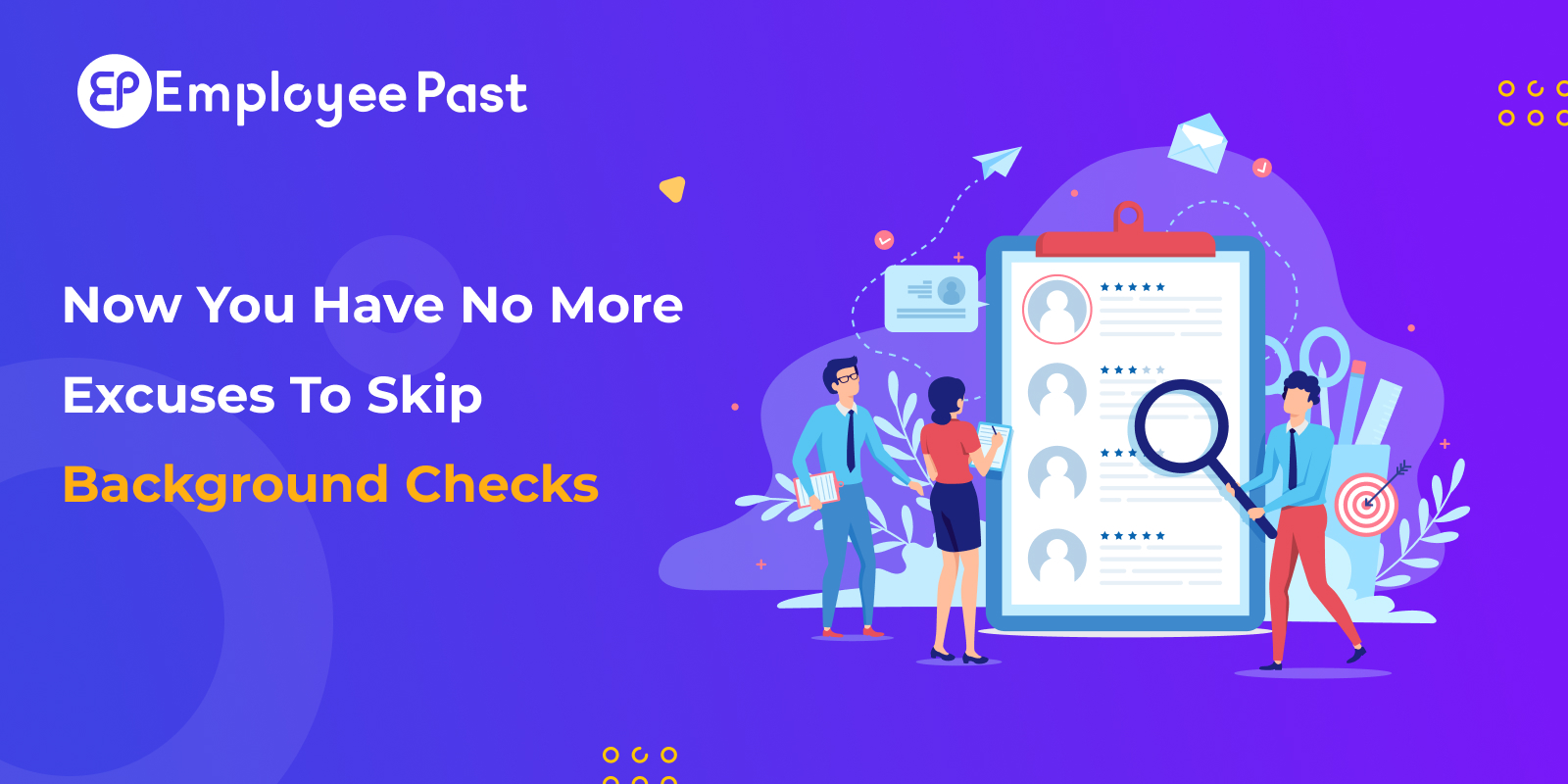- Dec 30, 2022
- Updates
- 11235
Share this post on:

The hiring process is incomplete without background checks. But, many hiring recruiters are ignoring background checks just to speed up the hiring process. Are you among those recruiters too? Or Have you ever considered skipping background checks as well? Is this acceptable?
The stats don’t lie: Why you should not skip background checks
According to a statistics report:
-
Nearly 60% of resumes lied about their educational backgrounds
-
Employee Fraud costs $400 billion a year to the companies
-
78% of job applicants provided wrong information in the resumes
-
79% of job applicants said that they have lied on their resume and were never caught.
-
45% of applicants gave false reasons for leaving their previous jobs
-
95% of businesses suffered employee theft and 75% have admitted that they have stolen a least once from their workplace.
-
Bad hires can cost millions to companies
-
One in six employees has a drug and alcohol issues
The above stats make it clear that verifying a candidate’s work history, educational history, and other histories is the most important part of the hiring process, even in the new remote era.
By being proactive and conducting a thorough investigation in Background checks organizations protect themselves from all possible threats. Proper background checks ensure safety and can maximize the productivity of the organization.
Understandably, hiring is a tiring process. It may, sometimes, take more time than expected and are costly and difficult. But skipping background checks is not a solution. But before moving further deep in this article, let’s look at a few hiring excuses that recruiters make. They are as follows:
-
We are a small business
-
Hiring in hurry
-
We know the candidate
-
Candidate looks trustworthy
Now, let’s discuss each of these excuses in detail.
1. We are a small business
Background checks are necessary for any organization, regardless the size. Hiring a good candidate is a must to grow the business. It is seen that good candidates may look at many other factors while accepting the offer. A wrong hiring can cost you business in many ways. It can lead to low productivity, or you can end up with unhappy clients that can damage your company’s reputation. So, even if you are a small company risking your reputation is not a good idea.
2. Hiring in a hurry
Never hire in a hurry. A lot of recruiters make an excuse that they don’t have time to do background checks because of hiring pressure. Also, companies want to hire as fast as they can because there might be a lot of work piled up and they are finding it difficult to fill a position. To overcome such scenarios recruiters must re-evaluate their hiring criteria. For example, maybe there is not an exact match for the skills you need for the job. Or maybe you have not posted the job description properly. These can be the reasons that you are finding it hard to find the right candidates and also, a good candidate might not get the idea of the job.
3. We know the candidate
Even if a recruiter knows the candidate it is mandatory to do background checks. If you hire a candidate based on the “we know the candidate” criteria, there is a high chance that you might not have the proper and complete information about the candidate. However, you might know the candidate, but it is not a good practice to violate the law and hire them without background checks. Good practice involves following the exact process for hiring that you have followed while hiring other candidates i.e. conducting a proper interview, background checks, and another screening process.
4. Candidate looks trustworthy
Hiring and trusting a candidate based on their outer appearance can be detrimental to any organization. Some candidates are good at faking personality and skills. Also, they can act as if they are well versed in the skills that they have written and can get the jobs. But after getting hired, they hardly perform well and can cause loss to the organization. But background checks prevent you from such detrimental issues and help you hire the right candidate with valid skills.
Now, moving further in this blog let us learn what are the things that are involved in background checking.
What background checking involves
Background checks look at the various factors associated with a candidate. According to Glassdoor, background checking cover employment background, credit history, criminal records, driving records, and many more. Let’s look into the various checks that are conducted during background checks:
-
Employment History
-
Credit History
-
Educational Background
-
Identity
-
Criminal History
-
Drug and Alcohol Tests
Employment History: The most common white lie on a resume related to employment is mentioning the wrong dates or stretching employment dates. This is done by candidates to cover or hide the gap that they have in their resumes. The main purpose of checking the employment history is to check whether the information mentioned by the candidate on the resume is true or not. Employment history ensures all the information like job title, salary, date of joining, and date of relieving of the previous employer. It is recommended not to lie about dates on the resume as background checks will find out the original employment dates and other information.
Education Background: Candidates are found lying about their educational history the most in their resumes. To get the job, few candidates mention false educational details. An education background checks the education history like degrees, high school, vocational school, colleges, universities, and other details. It also checks if the degrees taken by candidates were full-time or were a distance education. Also, an education background check involves certification checking. Some candidates have online certifications from reputed institutions that they have done using some e-Learning platform. But they show as if they studied in those universities to attract recruiters and get the job. Education Background checks help you:
-
Hire well-qualified and educated candidates
-
Lower the risk of hiring a candidate with false or fake educational background
-
Protect your business from liability issues.
Criminal History: Many employers consider criminal history to protect present employees and the company’s reputation. The criminal history checks tell the employer if the candidate is involved in any criminal activities or was involved previously. Criminal history also checks whether or not the candidate was involved in data theft from any previous organization. These checks give employers a heads-up about the candidate and they can decide whether the candidate is suitable for the job. Things that are paid the most attention during the criminal history checks are:
-
If the candidate was convicted by the police.
-
If the candidate is found in court records.
-
What was the result of the conviction? Was the candidate found guilty or innocent?
Bankruptcies: The deep background checks will check the bankruptcy filings. But the employer can not see the reason for filing bankruptcy. But the candidate can explain the reason to the employer and can explain why they suffered such a huge financial loss. Also, the candidate is supposed to tell the employers what steps they have taken to regain their footing.
Identity: Identity verification verifies the identity of a candidate. It is witnessed that sometimes candidates use fake profiles and they even create fake identity proof to get the job. And if they get hired without any background checks, there is a high possibility that they will continue to lie on the job. Identity search is done from many sources. It depends on the country you are issued your identity. Candidates are asked to provide their driver's license, passport, PAN card, or any other identity proof that is valid in the country.
Credit History: A candidate's credit history tells about how responsible he or she is. The credit history checks do not include your credit score but tell if you have paid things on time or not. Credit history involves the reports that have your personal information like your current address, previous address, Aadhar card number, PAN number, and finances like a credit card, student loan debt, mortgages, payments, late payments, and more. Also, employment credit history can go back 7 or 10 years depending on the candidate’s expected salary and more.
Drug and Alcohol Tests: Protecting employees is the responsibility of an organization. Employee drug background testing enhances the safety of your present employees and maintains a safe and secure environment.
The Stats says drug and alcohol problems cost businesses a loss of $100 Billion annually. It is seen that about 23 million Americans suffer from drug problems and out of that 25 % are employed.
It is seen that substance abuse leads to 4 to 8 times higher rates of absenteeism.
Pre-employment drug testing can stop the addicted candidate from joining your company. A substance-free environment promotes positivity, maintains discipline, and increases integrity, productivity, and professionalism. Also, employee drug background testing ensures the lesser conflicts and no unprofessional behavior.
Background Checks are easy with EmployeePast
All businesses regardless the size, try to maintain a balance between expenses. And one of the areas where the expenses are quite unpredictable in any organization is the cost of hiring. It is very hard to know the time it will take to fill a position as it involves a lot of factors like job posting, background check services, and many more.
It raises a valid question and that is “Are background checks expensive?” or “How expensive are background checks”? So, let us answer the question for you. The actual cost of background checks depends on many factors. A few factors are as follows:
Hiring Agencies - Companies pay a sound amount to these agencies and these agencies take all the steps that are involved in background check services.
Search Type - The cost also depends on the type of search you want to do.
Search Depth – The more in-depth details cost more.
Results Reported – The final report that is disclosed during and after the background checks can also cost a lot.
These are a few factors that make background checks costly. But skipping background checks will cost you business. So before opting for any background checks ensure that the service you are opting for is trustworthy and can help the business grow.
EmployeePast offers background check services that are cost-effective, secure, and fast. Many companies across the globe are using EmployeePast to onboard the right talent.
So, if you are looking for the most trustworthy, fast, and cost-effective Background Check Services, EmployeePast is here for you.
Try here.










